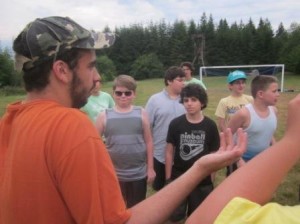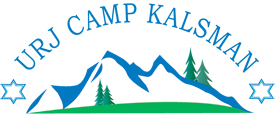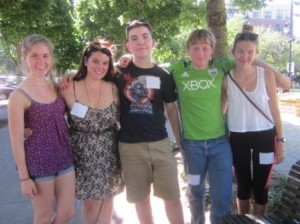by Rabbi Jason Levine, Camp Kalsman faculty
“Make Yourself a Teacher, Acquire Yourself a Friend, and Give All People the Benefit of the Doubt” –Pirke Avot 1:6
Last week I reclined in the Treehouse, studying this text with Machon, our Counselors-In-Training. Our conversation wandered and varied, as it often can with 17th year olds on the verge of adulthood, but we mostly mused on the intersection between being a peer, a buddy, a friend with a teacher, a guide, a role model. This balancing act is not an easy one to live out, and I was astounded over and over again with the incredible maturity and focus exhibited by our future leaders. This particular group of CITs, and the staff that leads them, is quite remarkable and inspiring. The question was asked – how do we act as both an equal and a leader at the same time? While we discussed specifics for CITs and counselors in general, the answer, to me, is clear – mentorship.
Mentorship is the act of turning to someone with less wisdom or experience with you and reaching out to help them learn something new or before comfortable in a new space. It is the perfect blend of the teacher vs. friend scenario proposed by our Sages. As we sing during Shira, “Don’t walk in front of me, I may not follow. Don’t walk behind me, I may not lead. Just walk beside me…” Teacher and friend are not separate concepts but instead one that blends into the key way to help others grow. And as the third part of the verse states, “Give all people the benefit of the doubt;” believe that each and every person you meet is destined for something great.
I witnessed acts of mentorship countless time during my week on Faculty. I saw directors coaching supervisors, supervisors advising counselors, counselors guiding CITs, Kesher campers helping Kochavim campers, Tzofim campers engaging Nitzazot and Coogarim campers, and peers supporting each other – the list goes on and on. I could easily write a full post about each incident.
But what struck me so deeply about all these acts of mentorship was how genuine they were. Each mentor, each teacher/friend truly wanted to form a connection and help each other be a better member of the Camp Kalsman community. Camp is about more than just having fun in the sun. It is about helping others reach their full potential. And it is a two way street. The mentee gained someone to look up to, someone to trust, someone to help them through difficult times. The mentor learned confidence in themselves, was able to reflect on decisions they had made, and had the joy of helping someone else.
The most poignant moment for me was watching a Tzofim girl interact with two new Coogarim girls. Earlier in the week, that exact Tzofim girl remarked on how she still felt like a kid despite moving up to a new unit and was shocked with how different it was. Yet, when those two little Coogarim looked up at the big girl in awe and amazement, I could see the gears click into place. Our Tzofim camper knew immediately that she was a role model to the littlest campers, and despite her friends calling her back to the table, sat with these two new friends for a while and helped them navigate a new area of camp culture. All I could was just smile.
 To me, Camp Kalsman demonstrates the ultimate goal of creating excited, enthusiastic, engaged young Jews through the beauty of mentorship. The atmosphere is so lively and filled with an air of wanting to help the people around you. “I’ll help you!,” as I heard screamed repeatedly in the Chadar Ochel. At camp, we turn to the people next to us and guide together – as a teacher and as a friend. It’s not just about going to Camp Kalsman each summer, but growing when we get there, each person helping the other, everyone mentoring someone else. We are all teachers and friends, and know every member of the Camp Kalsman family can grow into greatness.
To me, Camp Kalsman demonstrates the ultimate goal of creating excited, enthusiastic, engaged young Jews through the beauty of mentorship. The atmosphere is so lively and filled with an air of wanting to help the people around you. “I’ll help you!,” as I heard screamed repeatedly in the Chadar Ochel. At camp, we turn to the people next to us and guide together – as a teacher and as a friend. It’s not just about going to Camp Kalsman each summer, but growing when we get there, each person helping the other, everyone mentoring someone else. We are all teachers and friends, and know every member of the Camp Kalsman family can grow into greatness.

